| Listing 1 - 10 of 37 | << page >> |
Sort by
|
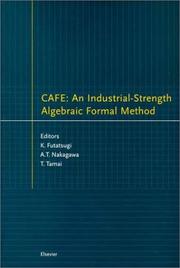
ISBN: 0444505563 9786611059675 1281059676 0080528406 9780080528403 9780444505569 Year: 2000 Publisher: Oxford : Elsevier,
Abstract | Keywords | Export | Availability | Bookmark
 Loading...
Loading...Choose an application
- Reference Manager
- EndNote
- RefWorks (Direct export to RefWorks)
This book contains selected papers on the language, applications, and environments of CafeOBJ, which is a state-of -the-art algebraic specification language. The authors are speakers at a workshop held in 1998 to commemorate a large industrial/academic project dedicated to CafeOBJ. The project involved more than 40 people from more than 10 organisations, of which 6 are industrial. The workshop attracted about 30 talks and more than 70 attendees. The papers in the book however, are either heavily revised versions presented at the workshop, to reflect recent advancements or research; or co
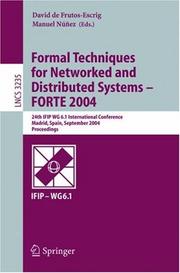
ISSN: 03029743 ISBN: 3540232524 9783540232520 Year: 2004 Volume: 3235 Publisher: Berlin: Springer,
Abstract | Keywords | Export | Availability | Bookmark
 Loading...
Loading...Choose an application
- Reference Manager
- EndNote
- RefWorks (Direct export to RefWorks)
Formal methods (Computer science) --- Electronic data processing --- Computer network protocols --- Distributed processing --- Congresses --- Méthodes formelles (Informatique) --- Traitement réparti --- Protocoles de réseaux d'ordinateurs --- Congresses. --- Congrès --- Formal methods (Computer science) - Congresses --- Electronic data processing - Distributed processing - Congresses --- Computer network protocols - Congresses
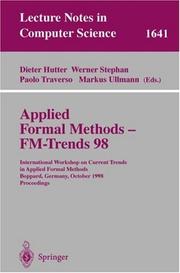
ISBN: 3540664629 9783540664628 9786610956777 1280956771 3540482571 Year: 1999 Volume: 1641 Publisher: Berlin: Springer,
Abstract | Keywords | Export | Availability | Bookmark
 Loading...
Loading...Choose an application
- Reference Manager
- EndNote
- RefWorks (Direct export to RefWorks)
This volume contains the contributions presented at the International Workshop on Current Trends in Applied Formal Methods organized October 7-9, 1998, in Boppard, Germany. The main objective of the workshop was to draw a map of the key issues facing the practical application of formal methods in industry. This appears to be particularly timely with safety and security issues becoming a real obstacle to industrial software and hardware development. As a consequence, almost all major companies have now set up departments or groups to work with formal methods and many European countries face a severe labour shortage in this new field. Tony Hoare's prediction of the art of software (and hardware) development becoming a proper engineering science with its own body of tools and techniques is now becoming a reality. So the focus of this application oriented workshop was not so much on spe cial academic topics but rather on the many practical aspects of this emerging new technology: verification and validation, and tool support and integration into the software life-cycle. By evaluating the state of the art with respect to industrial applications a discussion emerged among scientists, practising engi neers, and members of regulatory and funding agencies about future needs and developments. This discussion lead to roadmaps with respect to the future of this field, to tool support, and potential application areas and promising market segments. The contributions of the participants from industry as well as from the respective national security bureaus were particularly valuable and highly appreciated.
Formal methods (Computer science) --- Formal methods (Computer science) -- Congresses. --- Engineering & Applied Sciences --- Computer Science --- Méthodes formelles (Informatique) --- Congresses --- Congrès --- Méthodes formelles (Informatique) --- Congrès --- Computer science. --- Software engineering. --- Computer programming. --- Programming languages (Electronic computers). --- Computer logic. --- Mathematical logic. --- Computer Science. --- Programming Languages, Compilers, Interpreters. --- Software Engineering/Programming and Operating Systems. --- Logics and Meanings of Programs. --- Software Engineering. --- Programming Techniques. --- Mathematical Logic and Formal Languages. --- Logic design. --- Design, Logic --- Design of logic systems --- Digital electronics --- Electronic circuit design --- Logic circuits --- Machine theory --- Switching theory --- Computer software engineering --- Engineering --- Informatics --- Science --- Algebra of logic --- Logic, Universal --- Mathematical logic --- Symbolic and mathematical logic --- Symbolic logic --- Mathematics --- Algebra, Abstract --- Metamathematics --- Set theory --- Syllogism --- Computers --- Electronic computer programming --- Electronic data processing --- Electronic digital computers --- Programming (Electronic computers) --- Coding theory --- Computer science logic --- Logic, Symbolic and mathematical --- Computer languages --- Computer program languages --- Computer programming languages --- Machine language --- Languages, Artificial --- Programming --- Formal methods (Computer science) - Congresses
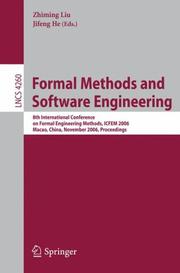
ISSN: 03029743 ISBN: 9783540474609 3540474609 3540474625 Year: 2006 Volume: 4260 Publisher: Berlin: Springer,
Abstract | Keywords | Export | Availability | Bookmark
 Loading...
Loading...Choose an application
- Reference Manager
- EndNote
- RefWorks (Direct export to RefWorks)
Formal methods (Computer science) --- Software engineering --- Méthodes formelles (Informatique) --- Génie logiciel --- Congresses. --- Congrès --- Computer Science --- Engineering & Applied Sciences --- Information Technology --- Software Engineering --- Computer science. --- Software engineering. --- Programming languages (Electronic computers). --- Computer logic. --- Computer Science. --- Software Engineering/Programming and Operating Systems. --- Software Engineering. --- Logics and Meanings of Programs. --- Programming Languages, Compilers, Interpreters. --- Computer science logic --- Logic, Symbolic and mathematical --- Computer languages --- Computer program languages --- Computer programming languages --- Machine language --- Electronic data processing --- Languages, Artificial --- Computer software engineering --- Engineering --- Informatics --- Science --- Logic design. --- Design, Logic --- Design of logic systems --- Digital electronics --- Electronic circuit design --- Logic circuits --- Machine theory --- Switching theory --- Formal methods (Computer science) - Congresses. --- Software engineering - Congresses.
Book
ISBN: 1461465338 1461465346 Year: 2013 Publisher: New York : Springer,
Abstract | Keywords | Export | Availability | Bookmark
 Loading...
Loading...Choose an application
- Reference Manager
- EndNote
- RefWorks (Direct export to RefWorks)
Performance Evaluation Software: Moving Object Detection and Tracking in Videos introduces a software approach for the real-time evaluation and performance comparison of the methods specializing in moving object detection and/or tracking (D&T) in video processing. Digital video content analysis is an important item for multimedia content-based indexing (MCBI), content-based video retrieval (CBVR) and visual surveillance systems. There are some frequently-used generic algorithms for video object D&T in the literature, such as Background Subtraction (BS), Continuously Adaptive Mean-shift (CMS), Optical Flow (OF), etc. An important problem for performance evaluation is the absence of any stable and flexible software for comparison of different algorithms. In this frame, we have designed and implemented the software for comparing and evaluating the well-known video object D&T algorithms on the same platform. This software is able to compare them with the same metrics in real-time and on the same platform. It also works as an automatic and/or semi-automatic test environment in real-time, which uses the image and video processing essentials, e.g. morphological operations and filters, and ground-truth (GT) XML data files, charting/plotting capabilities, etc. Along with the comprehensive literature survey of the abovementioned video object D&T algorithms, this book also covers the technical details of our performance benchmark software as well as a case study on people D&T for the functionality of the software.
Formal methods (Computer science) -- Congresses. --- Integrated circuits -- Verification -- Congresses. --- Engineering & Applied Sciences --- Computer Science --- Digital video. --- Pattern recognition systems. --- Image processing --- Digital techniques. --- Digital image processing --- Pattern classification systems --- Pattern recognition computers --- Digital motion video --- PC video --- Video, Digital --- Computer science. --- Multimedia information systems. --- User interfaces (Computer systems). --- Computer Science. --- Multimedia Information Systems. --- User Interfaces and Human Computer Interaction. --- Digital electronics --- Pattern perception --- Computer vision --- Computer graphics --- Digital media --- Multimedia systems --- Digital techniques --- Multimedia systems. --- Informatics --- Science --- Computer-based multimedia information systems --- Multimedia computing --- Multimedia information systems --- Multimedia knowledge systems --- Information storage and retrieval systems --- Interfaces, User (Computer systems) --- Human-machine systems --- Human-computer interaction
Book
ISBN: 1441980334 9786612972843 1441980342 1282972847 1489981500 Year: 2010 Publisher: New York : Springer Science+Business Media, LLC,
Abstract | Keywords | Export | Availability | Bookmark
 Loading...
Loading...Choose an application
- Reference Manager
- EndNote
- RefWorks (Direct export to RefWorks)
Post-Silicon and Run-Time Verification for Modern Processors surveys the state of the art and evolving directions in post-silicon and runtime verification. The volume gives an overview of the state of the art in verification, particularly current post-silicon methodologies in use in the industry, both for the domain of processor pipeline design and for memory subsystems. There is also a thorough presentation of several new post-silicon verification solutions aimed at boosting the verification coverage of modern processors. The presentation of runtime verification solutions follows a similar approach. This is an area of processor design that is still in its early stages of exploration and could help accomplish the ultimate goal of complete correctness guarantees for microprocessor-based computation. The book also: · Addresses an area of hardware verification that is growing both in industry and academia · Covers hardware patching and error avoidance · Discusses multi-core processors with test generation and response evaluation The authors conclude the book with a look towards the future of late-stage verification and its growing role in the processor life-cycle. Post-Silicon and Run-Time Verification for Modern Processors will be a valuable book for researchers and engineers working in electrical engineering.
Computer architecture. --- Computer software -- Testing -- Congresses. --- Computer software -- Verification -- Congresses. --- Formal methods (Computer science) -- Congresses. --- Logic circuits. --- Microprocessors -- Design and construction. --- Electrical & Computer Engineering --- Engineering & Applied Sciences --- Electrical Engineering --- Computer software --- Computer programs --- Verification of computer programs --- Software verification --- Verification of software --- Verification. --- Engineering. --- Computer hardware. --- Computer-aided engineering. --- Electronic circuits. --- Circuits and Systems. --- Computer Hardware. --- Computer-Aided Engineering (CAD, CAE) and Design. --- Systems engineering. --- Computer aided design. --- CAD (Computer-aided design) --- Computer-assisted design --- Computer-aided engineering --- Design --- Engineering systems --- System engineering --- Engineering --- Industrial engineering --- System analysis --- Design and construction --- CAE --- Electron-tube circuits --- Electric circuits --- Electron tubes --- Electronics --- Data processing
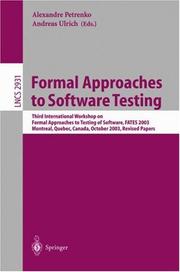
ISSN: 03029743 ISBN: 3540208941 9786610306763 1280306769 3540246177 9783540208945 Year: 2004 Volume: 2931 Publisher: Berlin, Heidelberg : Springer Berlin Heidelberg : Imprint: Springer,
Abstract | Keywords | Export | Availability | Bookmark
 Loading...
Loading...Choose an application
- Reference Manager
- EndNote
- RefWorks (Direct export to RefWorks)
Formal methods provide system designers with the possibility to analyze system models and reason about them with mathematical precision and rigor. The use of formal methods is not restricted to the early development phases of a system, though. The di?erent testing phases can also bene?t from them to ease the p- duction and application of e?ective and e?cient tests. Many still regard formal methods and testing as an odd combination. Formal methods traditionally aim at verifying and proving correctness (a typical academic activity), while testing shows only the presence of errors (this is what practitioners do). Nonetheless, there is an increasing interest in the use of formal methods in software testing. It is expected that formal approaches are about to make a major impact on eme- ing testing technologies and practices. Testing proves to be a good starting point for introducing formal methods in the software development process. This volume contains the papers presented at the 3rd Workshop on Formal Approaches to Testing of Software, FATES 2003, that was in a?liation with the IEEE/ACM Conference on Automated Software Engineering (ASE 2003). This year, FATES received 43 submissions. Each submission was reviewed by at least three independent reviewers from the program committee with the help of - ditional reviewers. Based on their evaluations, 18 papers submitted by authors from 13 di?erent countries were selected for presentation at the workshop.
Formal methods (Computer science) --- Computer software --- Testing --- Computer science. --- Software engineering. --- Programming languages (Electronic computers). --- Computer logic. --- Computer Science. --- Software Engineering/Programming and Operating Systems. --- Software Engineering. --- Programming Languages, Compilers, Interpreters. --- Logics and Meanings of Programs. --- Logic design. --- Design, Logic --- Design of logic systems --- Digital electronics --- Electronic circuit design --- Logic circuits --- Machine theory --- Switching theory --- Informatics --- Science --- Computer software engineering --- Engineering --- Computer science logic --- Logic, Symbolic and mathematical --- Computer languages --- Computer program languages --- Computer programming languages --- Machine language --- Electronic data processing --- Languages, Artificial --- Formal methods (Computer science) - Congresses --- Computer software - Testing - Congresses --- Programming languages (Electronic computers)
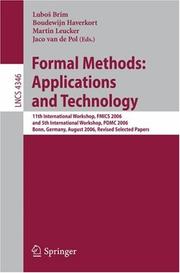
ISSN: 03029743 ISBN: 9783540709510 3540709517 9786610935772 1280935774 3540709525 Year: 2006 Volume: 4346 Publisher: Berlin: Springer,
Abstract | Keywords | Export | Availability | Bookmark
 Loading...
Loading...Choose an application
- Reference Manager
- EndNote
- RefWorks (Direct export to RefWorks)
These are the joint ?nal proceedings of the 11th International Workshop on Formal Methods for Industrial Critical Systems (FMICS 2006) and the ?fth International Workshop on Parallel and Distributed Methods in Veri?cation (PDMC 2006). Both workshops were organized as satellite events of CONCUR 2006, the 17th International Conference on Concurrency Theory that was or- nized in Bonn, August 2006. The FMICS workshop continued successfully the aim of the FMICS working group – to promote the use of formal methods for industrial applications, by supporting research in this area and its application in industry. The emphasis in these workshops is on the exchange of ideas between researchers and prac- tioners, in both industry and academia. This year the Program Committee received a record number of submissions. The 16 accepted regular contributions and 2 accepted tool papers, selected out of a total of 47 submissions, cover formal methodologies for handling large state spaces, model-based testing, formal description and analysis techniques as well as a range of applications and case studies. The workshop program included two invited talks, by Anna Slobodova from Intel on “Challenges for Formal Veri?cation in an Industrial Setting” and by Edward A. Lee from the University of California at Berkeley on “Making C- currency Mainstream.” The former full paper can be found in this volume.
Formal methods (Computer science) --- Software engineering --- Computer programs --- Computer software --- Verification --- Reliability --- Congresses --- Congresses. --- Computer programs -- Reliability -- Congresses. --- Computer programs -- Verification -- Congresses. --- Computer software -- Reliability -- Congresses. --- Computer software -- Verification -- Congresses. --- Formal methods (Computer science) -- Congresses. --- Software engineering -- Congresses. --- Computer science. --- Special purpose computers. --- Software engineering. --- Programming languages (Electronic computers). --- Computers. --- Computer logic. --- Computer Science. --- Theory of Computation. --- Software Engineering. --- Logics and Meanings of Programs. --- Programming Languages, Compilers, Interpreters. --- Special Purpose and Application-Based Systems. --- Computer science logic --- Logic, Symbolic and mathematical --- Automatic computers --- Automatic data processors --- Computer hardware --- Computing machines (Computers) --- Electronic brains --- Electronic calculating-machines --- Electronic computers --- Hardware, Computer --- Computer systems --- Cybernetics --- Machine theory --- Calculators --- Cyberspace --- Computer languages --- Computer program languages --- Computer programming languages --- Machine language --- Electronic data processing --- Languages, Artificial --- Computer software engineering --- Engineering --- Special purpose computers --- Computers --- Informatics --- Science --- Computer program files --- Files, Computer program --- Program files, Computer --- Programs, Computer --- Computer files --- Information Technology --- Software Engineering --- Information theory. --- Logic design. --- Design, Logic --- Design of logic systems --- Digital electronics --- Electronic circuit design --- Logic circuits --- Switching theory --- Communication theory --- Communication --- Formal methods (Computer science) - Congresses. --- Software engineering - Congresses. --- Computer programs - Verification - Congresses. --- Computer programs - Reliability - Congresses --- Computer software - Verification - Congresses. --- Computer software - Reliability - Congresses. --- Programming languages (Electronic computers) --- Computers, Special purpose.
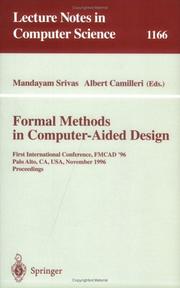
ISBN: 3540619372 3540495673 9783540619376 Year: 1996 Volume: 1166 Publisher: Berlin: Springer,
Abstract | Keywords | Export | Availability | Bookmark
 Loading...
Loading...Choose an application
- Reference Manager
- EndNote
- RefWorks (Direct export to RefWorks)
This book constitutes the refereed proceedings of the First International Conference on Formal Methods in Computer-Aided Design, FMCAD '96, held in Palo Alto, California, USA, in November 1996. The 25 revised full papers presented were selected from a total of 65 submissions; also included are three invited survey papers and four tutorial contributions. The volume covers all relevant formal aspects of work in computer-aided systems design, including verification, synthesis, and testing.
Digital integrated circuits --- Computer-aided design --- Automatic theorem proving --- Integrated circuits --- Conception assistée par ordinateur --- Théorèmes --- Circuits intégrés --- Design and construction --- Data processing --- Congresses. --- Verification --- Congrès --- Démonstration automatique --- Vérification --- Computer engineering --- Formal methods (Computer science) --- Electrical Engineering --- Electrical & Computer Engineering --- Engineering & Applied Sciences --- Congresses --- Computer aided design. --- Information theory. --- Computer hardware. --- Logic design. --- Computer science. --- Computer-Aided Engineering (CAD, CAE) and Design. --- Theory of Computation. --- Computer Engineering. --- Computer Hardware. --- Logics and Meanings of Programs. --- Mathematical Logic and Formal Languages. --- Informatics --- Science --- Design, Logic --- Design of logic systems --- Digital electronics --- Electronic circuit design --- Logic circuits --- Machine theory --- Switching theory --- Communication theory --- Communication --- Cybernetics --- CAD (Computer-aided design) --- Computer-assisted design --- Computer-aided engineering --- Design --- Digital integrated circuits - Computer-aided design - Congresses. --- Automatic theorem proving - Congresses. --- Integrated circuits - Verification - Congresses. --- Computer engineering - Computer-aided design - Congresses. --- Formal methods (Computer science) - Congresses.
Book
ISSN: 03029743 ISBN: 9783642158988 9783642158971 3642158978 9786613567130 3642158986 1280389214 Year: 2010 Volume: 6371 Publisher: Berlin: Springer,
Abstract | Keywords | Export | Availability | Bookmark
 Loading...
Loading...Choose an application
- Reference Manager
- EndNote
- RefWorks (Direct export to RefWorks)
This volume contains the papers presented at FMICS 2010, the 15th Inter- tional Workshop on Formal Methods for Industrial Critical Systems, which was held on September 20-21, 2010, in Antwerp, Belgium. Previous workshops of the ERCIM working group on Formal Methods for Industrial Critical Systems wereheld in Oxford(March 1996),Cesena (July 1997),Amsterdam (May 1998), Trento (July 1999), Berlin (April 2000), Paris (July 2001), Malaga (July 2002), Trondheim(June2003),Linz(September 2004),Lisbon(September 2005),Bonn (August 2006), Berlin (July 2007), L'Aquila (September 2008), and Eindhoven (November 2009). The aim of the FMICS workshop series is to provide a forum for researchers who are interested in the development and application of formal methods in industry. In particular, these workshops bring together scientists and engineers who are active in the area of formal methods and are interested in exchanging their experiences in the industrial usage of these methods. These workshops also strive to promote research and development for the improvement of formal methods and tools for industrial applications. The FMICS 2010 workshop was co-located with ASE 2010, the 25th IEEE/ACMInternationalConferenceonAutomatedSoftwareEngineering,which o?ereda choiceofeventsintheareainadditionto themainconference.More- formation about ASE 2010 and the co-located events can be found on http://soft.vub.ac.be/ase2010/.
Computer Science. --- Software Engineering. --- Logics and Meanings of Programs. --- Programming Languages, Compilers, Interpreters. --- Special Purpose and Application-Based Systems. --- Computer science. --- Software engineering. --- Logic design. --- Informatique --- Génie logiciel --- Structure logique --- Formal methods (Computer science) --- Software engineering --- Computer programs --- Computer software --- Verification --- Reliability --- Congresses --- Engineering & Applied Sciences --- Computer Science --- Information Technology --- Software Engineering --- Computer program files --- Files, Computer program --- Program files, Computer --- Programs, Computer --- Special purpose computers. --- Programming languages (Electronic computers). --- Computer logic. --- Computer science logic --- Logic, Symbolic and mathematical --- Computer languages --- Computer program languages --- Computer programming languages --- Machine language --- Electronic data processing --- Languages, Artificial --- Computer software engineering --- Engineering --- Special purpose computers --- Computers --- Informatics --- Science --- Computer files --- Design, Logic --- Design of logic systems --- Digital electronics --- Electronic circuit design --- Logic circuits --- Machine theory --- Switching theory --- Antwerpen <2010> --- Formal methods (Computer science) - Congresses --- Software engineering - Congresses --- Computer programs - Verification - Congresses --- Computer programs - Reliability - Congresses --- Computer software - Verification - Congresses
| Listing 1 - 10 of 37 | << page >> |
Sort by
|

 Search
Search Feedback
Feedback About UniCat
About UniCat  Help
Help News
News